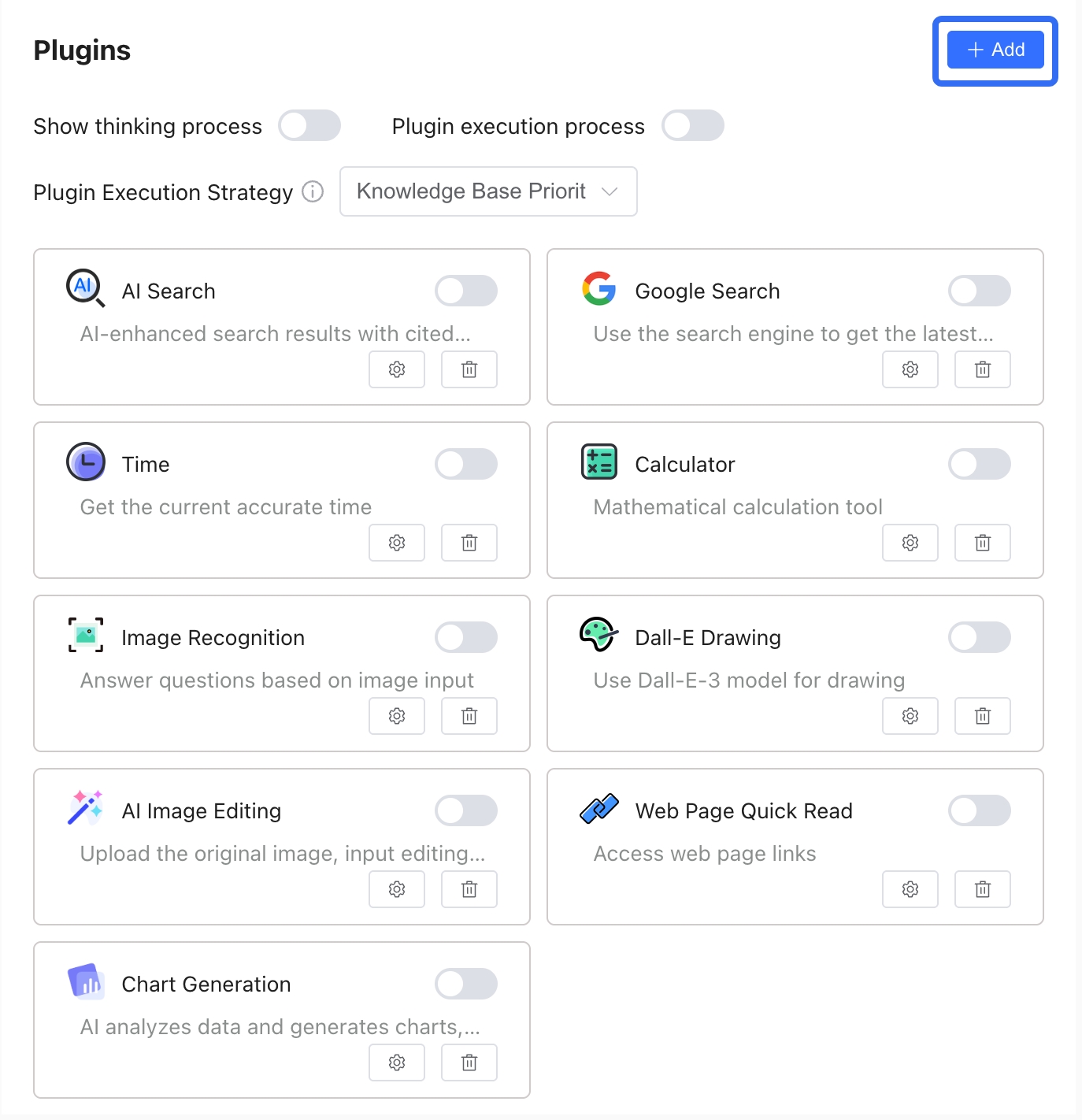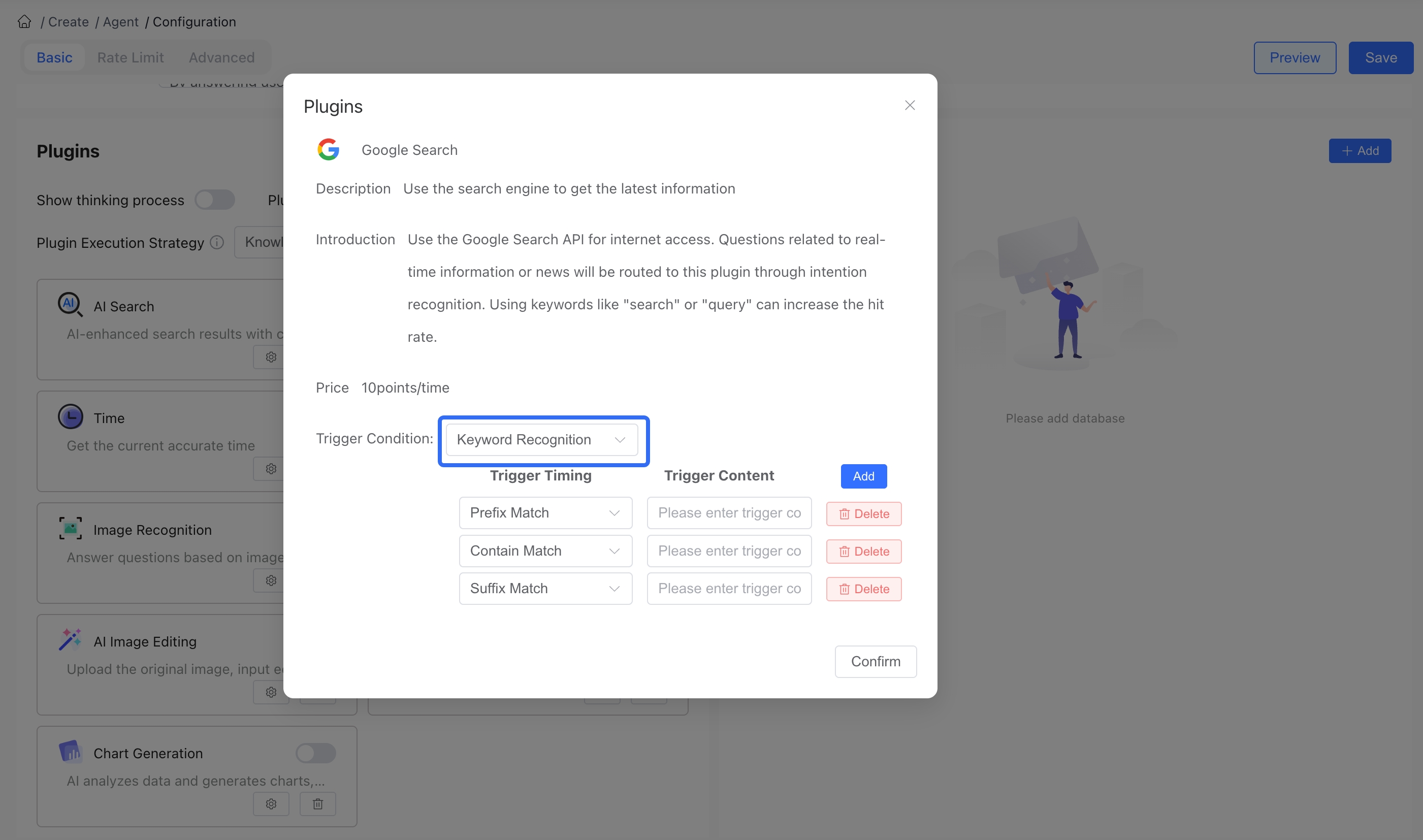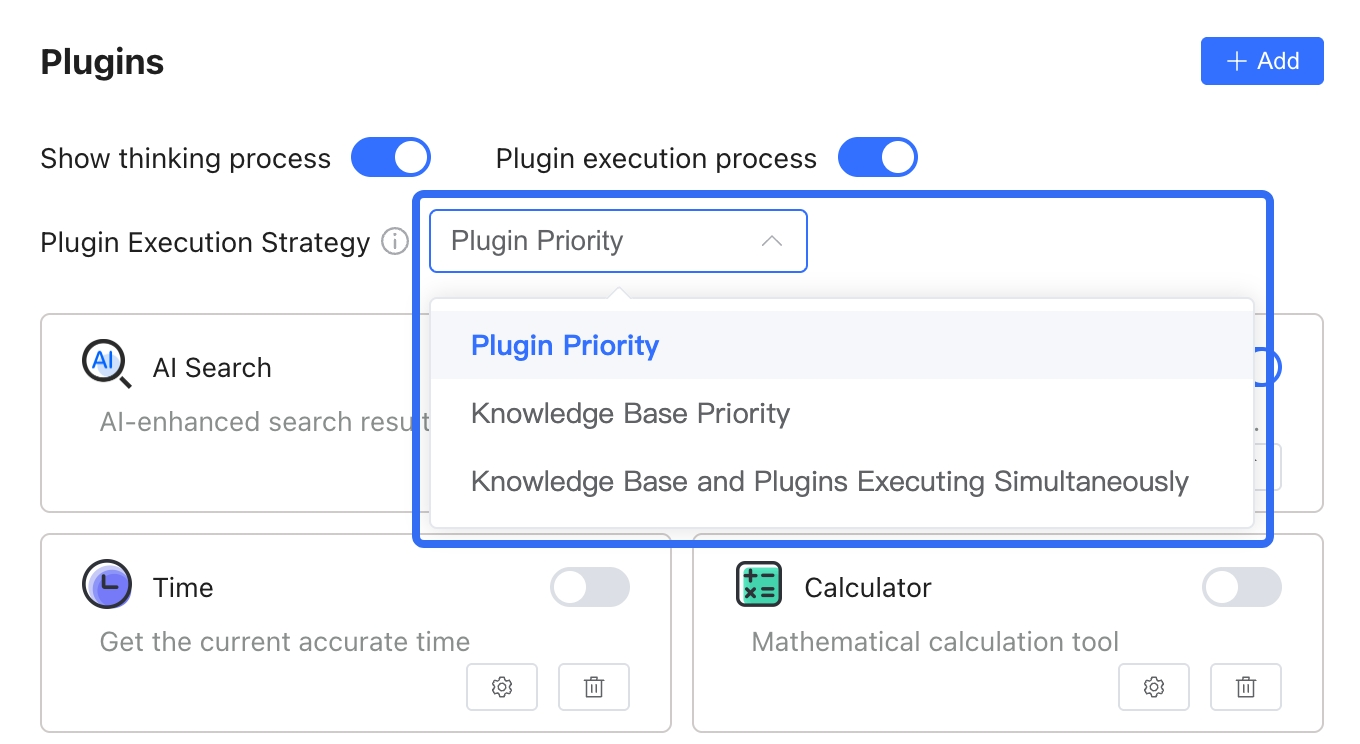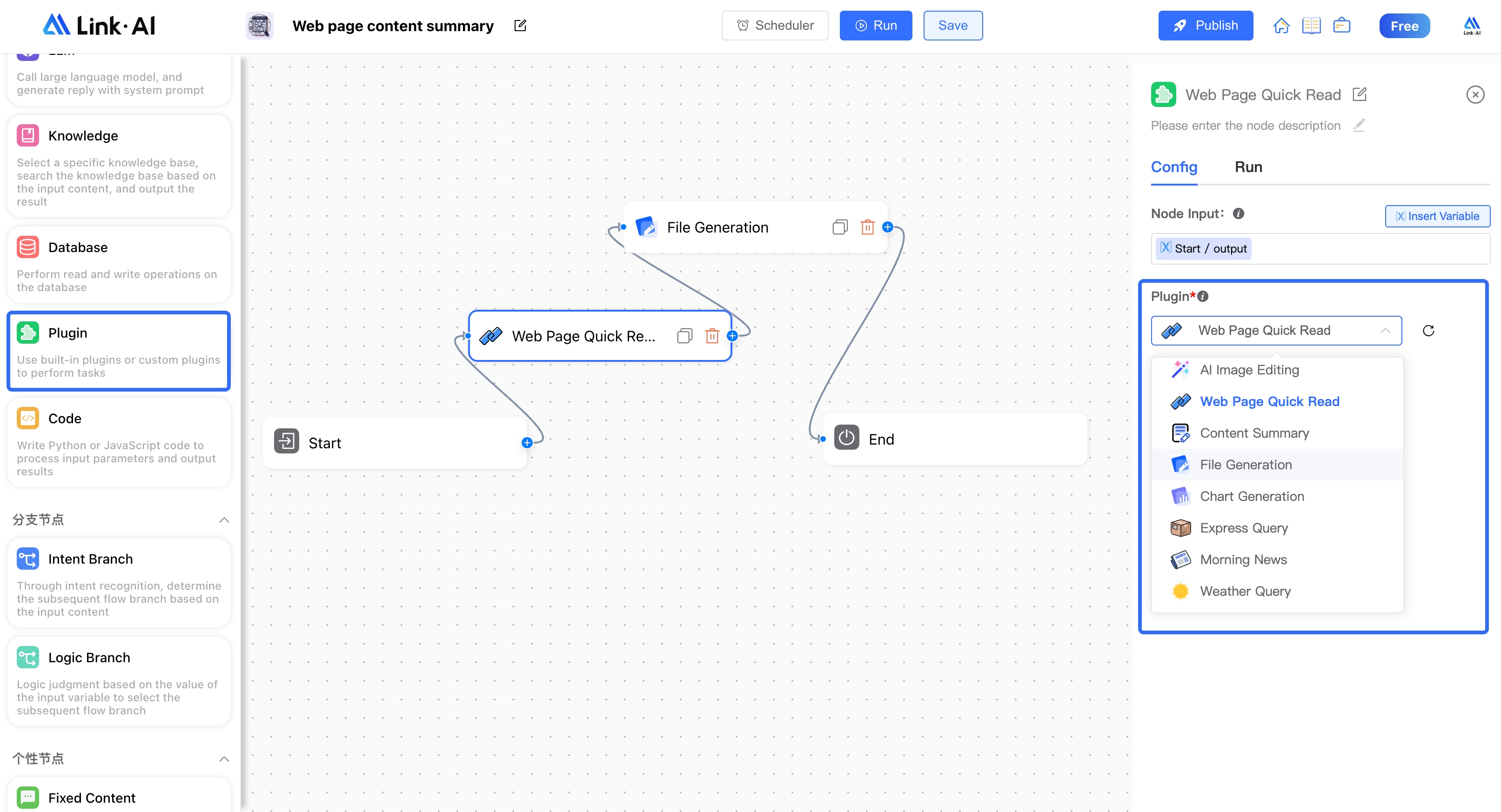Plugins
Plugins extend and enhance model capabilities, allowing your agents to interact with external data sources, tools, and systems. Each plugin encapsulates a specific atomic capability. Plugins are now compatible with the MCP protocol, supporting one-click conversion of MCP Servers into plugins for agent use.
Plugins work by analyzing user queries through intent recognition (or alternatively through keyword matching) to make decisions and invoke the appropriate plugin capability. For example, when you ask about the latest real-time information or news, it will decide to use the search plugin; when you ask about mathematical calculations, it will use the calculator plugin.
This document introduces the platform's built-in plugins and usage methods. For custom plugins that execute external requests and connect to your own or third-party services, please refer to the Custom Plugins documentation.
1. Built-in Plugins
Built-in plugins are ready-to-use plugins provided by the LinkAI platform. For a complete list, visit: Plugin Center
| Plugin Name | Description | Trigger Condition | Price (Credits) |
|---|---|---|---|
| MCP Plugins | Built-in plugins include multiple curated MCP plugins such as Amap, Baidu Maps, Bocha Search, News Aggregation, Web Deployment, etc., with continuous updates | Intent recognition / Keywords | See plugin details |
| Current Time | Get accurate current time | Triggered when user asks time-related questions | 0 |
| Calculator | Performs addition, subtraction, multiplication, division, and exponentiation | Triggered by math-related questions or set keywords | 0 |
| AI Search | AI-enhanced search with richer, structured results, showing search result sources, and (on web) one-click navigation to corresponding pages | Triggered by questions about real-time information or news, or by set keywords | 10 credits/query (excluding LLM tokens) |
| Google Search | Get the latest information using Google search engine | Triggered by questions about real-time information or news, or by set keywords | 10 credits/query (excluding LLM tokens) |
| Bing Search | Get the latest information using Bing search engine (supports user-hosted API Keys, which will only be used by that user) | Triggered by questions about real-time information or news, or by set keywords | 60 credits/query (excluding LLM tokens) |
| Web Reader | Access content from web links | Triggered by directly sending a link or sending a link with a question, or by set keywords | 0 (excluding LLM tokens) |
| Content Summary | Summarize file content and enable conversation | Triggered by directly sending a file (PDF, docx, txt, markdown) | 6 credits/thousand tokens |
| Douban Text-to-Image | Generate images using ByteDance Douban text-to-image model | Triggered by user's image generation intent or by set keywords | 150 credits/image |
| DALL-E Text-to-Image | Generate images using Dall-E-3 model | Triggered by user's image generation intent or by set keywords | 200 credits/image |
| GPT-Image-1 Plugin | Image tool based on GPT-image-1 model, supporting image generation and modification | 250 credits/thousand tokens | |
| Image Recognition | Question answering based on image input | Triggered by sending an image (channel settings can be configured to trigger on image-only or image+text) | GPT-4o: 1 credit/15 tokens; GPT-4-vision: 1 credit/10 tokens Claude models: 1 credit/20 tokens Qianwen models: 1 credit/60 tokens OCR: 25 credits/query |
| File Generation | Generate files based on input text content in workflows | Triggered when the workflow reaches this plugin node | 0 |
| Chart Generation | For AI data analysis and chart generation in workflows, supporting line charts, pie charts, and bar charts | Used in workflow plugin nodes | 5 credits/chart |
2. Agent Configuration
In the "Agent Settings" - "Plugin Configuration" module, you can configure which plugins to enable for your agent. Each agent comes with several default plugins that are disabled by default. You can enable them by toggling the switch, and add more built-in plugins by clicking the "Add Plugin" button.

2.1 Plugin Trigger Conditions
The default trigger condition for built-in plugins is through intent recognition of user queries, matching the most suitable plugin based on plugin descriptions. For example, when a user query contains search intent, it will trigger the search plugin. Custom plugins are triggered through intent recognition of user queries, judging the relevance between the query and the plugin description. For details, see Custom Plugins.
You can also set plugins to trigger based on keywords (prefix match, contains match, suffix match) to improve trigger success rates.

2.2 Plugin Execution and Reasoning Process
When plugin execution process is enabled, the currently selected plugin will be displayed during execution. When the reasoning process is enabled, the agent's analysis of the problem and its reasoning for selecting that plugin will also be shown. For MCP plugins, the combined execution process of multiple tools under the plugin will be displayed:

2.3 Plugin Execution Strategy
For knowledge base agents, you can also select a plugin execution strategy:

Strategy descriptions:
- Knowledge Base Priority: Prioritizes searching the knowledge base for user questions, only selecting plugins if no matches are found
- Plugin Priority: Prioritizes plugin decision-making, only searching the knowledge base if no plugin matches
- Simultaneous Execution: Attempts to both search the knowledge base and select plugins for each request, summarizing both results to answer the question
3. Workflow Configuration
In workflow plugin nodes, you can select all built-in and custom plugins. Unlike in agents, workflows execute plugins based on the actual node execution path without requiring intent recognition. After execution, you typically need to connect to an LLM node to transform the plugin's raw output into natural language.

For detailed documentation, refer to: Workflow - Plugin Node Documentation
4. External Calls
4.1 Channel Integration
Channels can access plugin capabilities by integrating with agents or workflows. Here's an example of generating a travel plan by combining weather, location query, and route planning tools:

4.2 API Integration
When integrating with LinkAI agents or workflows via API, plugin capabilities are seamlessly supported. The Open API response will include plugin execution and reasoning process fields, with a response structure like this:
{
"agent": {
"status": "FINISHED",
"chain": [
{
"plugin_name": "Google Search",
"thought": "This question requires searching for the Douban rating of the movie 'Rock Solid', so I'll use Google search engine to get the relevant information.",
"plugin_icon": "🔎",
"plugin_input": "movie Rock Solid Douban rating"
}
],
"need_show_plugin": true,
"need_show_thought": true
}
}